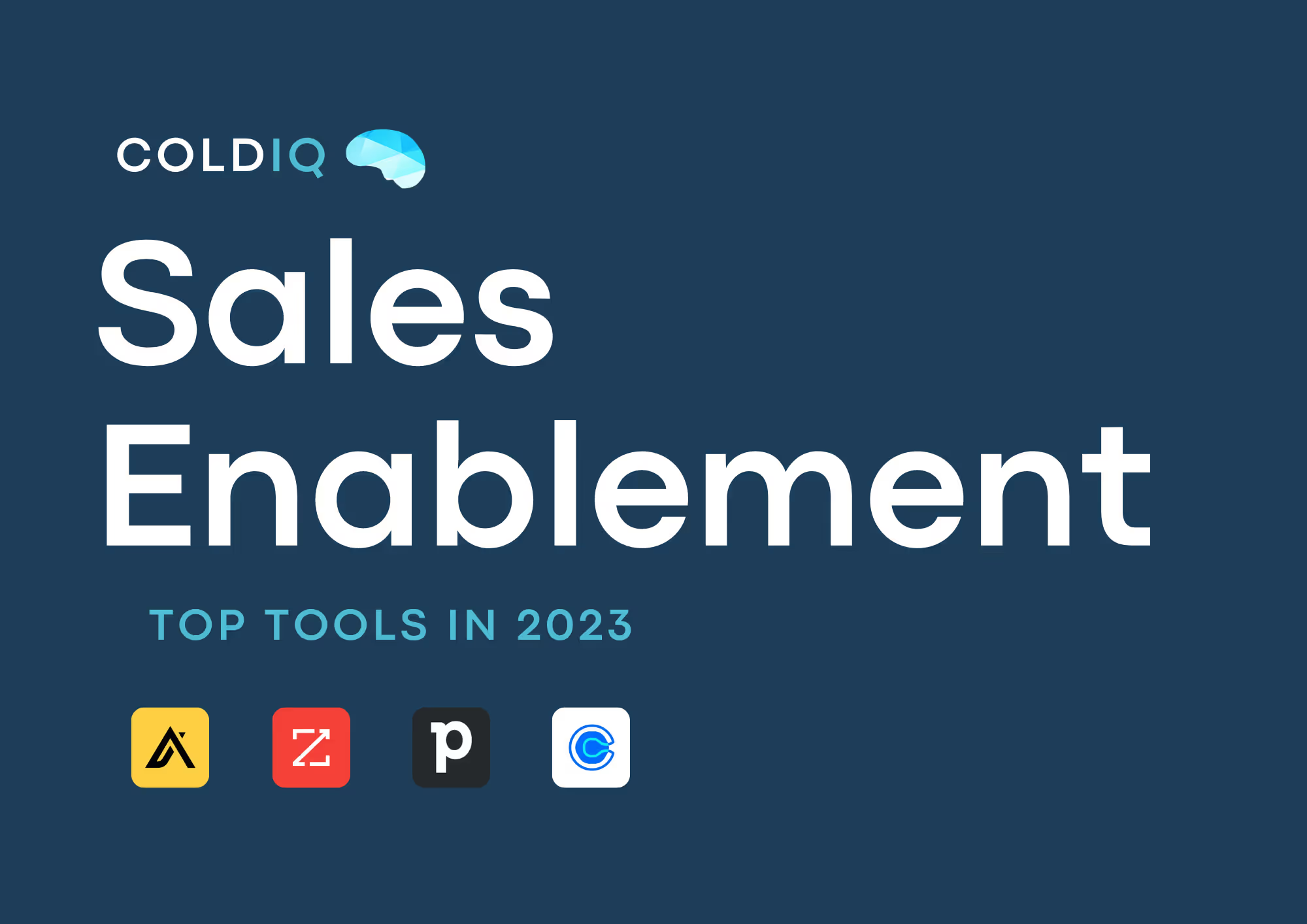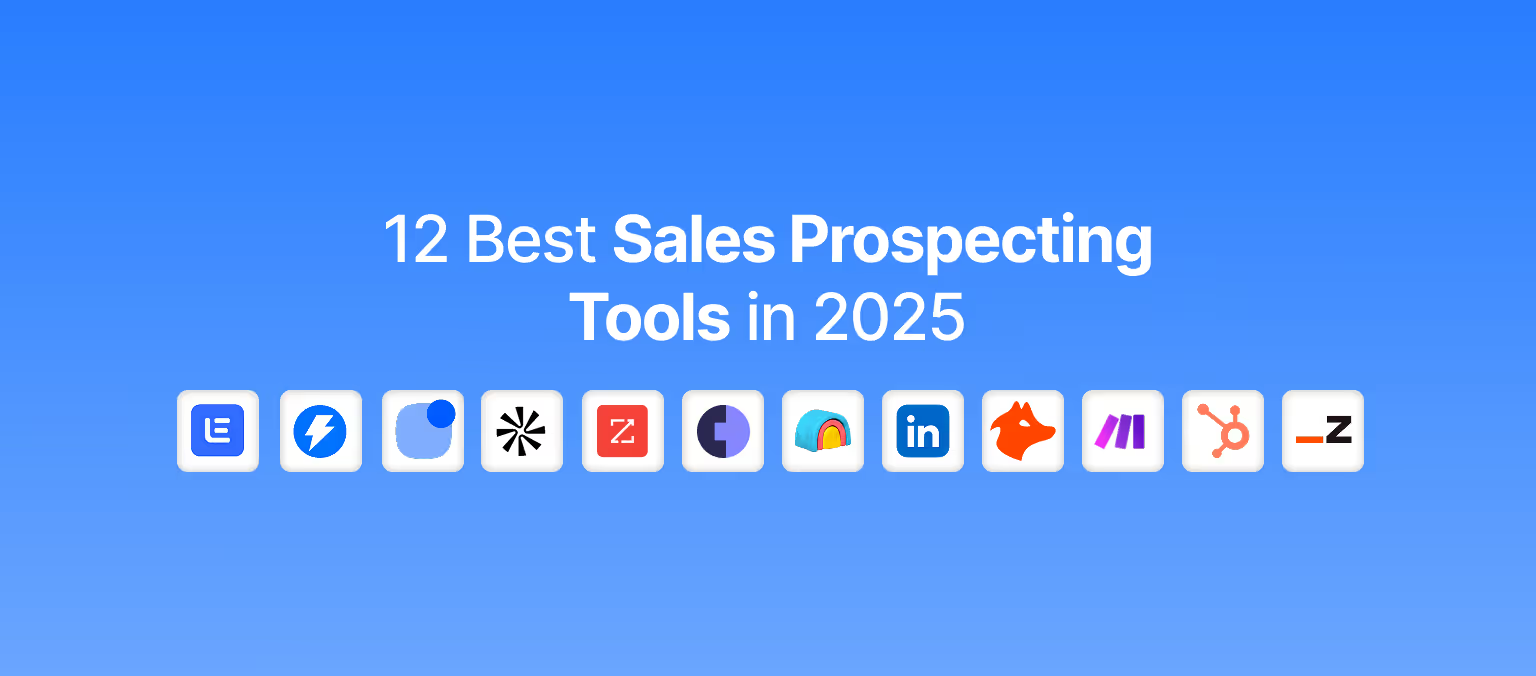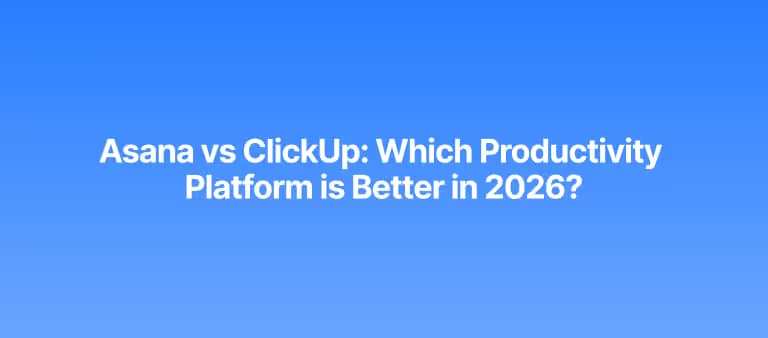How to Identify Your Website Visitors (and Reach Out to Them Automatically)

Many people interested in your products or services will browse your website and won’t contact you. If you can’t identify who they are, chances are you will miss out on the opportunities too.
However, recent technologies have made it easy to identify website visitors and provide useful information that enables you to contact them. In this article, we will explore how you can identify your website visitors and automatically reach out to them. Let’s get started.
What is Website Visitor Identification?
Website visitor identification is a process that reveals information about anonymous people or companies visiting your website. It involves using technologies (such as IP address tracking and cookies) to obtain relevant information such as your visitor’s full name, email address, pages visited, and more.
Thanks to these technologies, you can identify high-intent accounts that visit your website and contact them to follow up on their interests. This approach effectively converts cold traffic into warm leads and gets them to your sales pipeline.
How Does Website Visitor Identification Work?
Many devices today have a unique internet protocol (IP) address. This address consists of various contact information about the user. Visitor identification tools use technologies such as cookies and reverse DNS record to find these IP addresses and obtain various information about anonymous website visitors.
Some of the information includes company or individual names, email addresses, phone numbers, industry, revenue, and more. You can access all the information in a spreadsheet or store it in your customer relationship management (CRM) software. For a more visual explanation, watch this video:
Best Tools for Identifying Website Visitors and Reaching Out to Them
As a B2B business owner, you have a variety of web visitor identification and outreach tools to choose from. However, we will only focus on three tools in this section.
Identifying Your Website Visitors
1. RB2B — Best for Web Visitor Identity
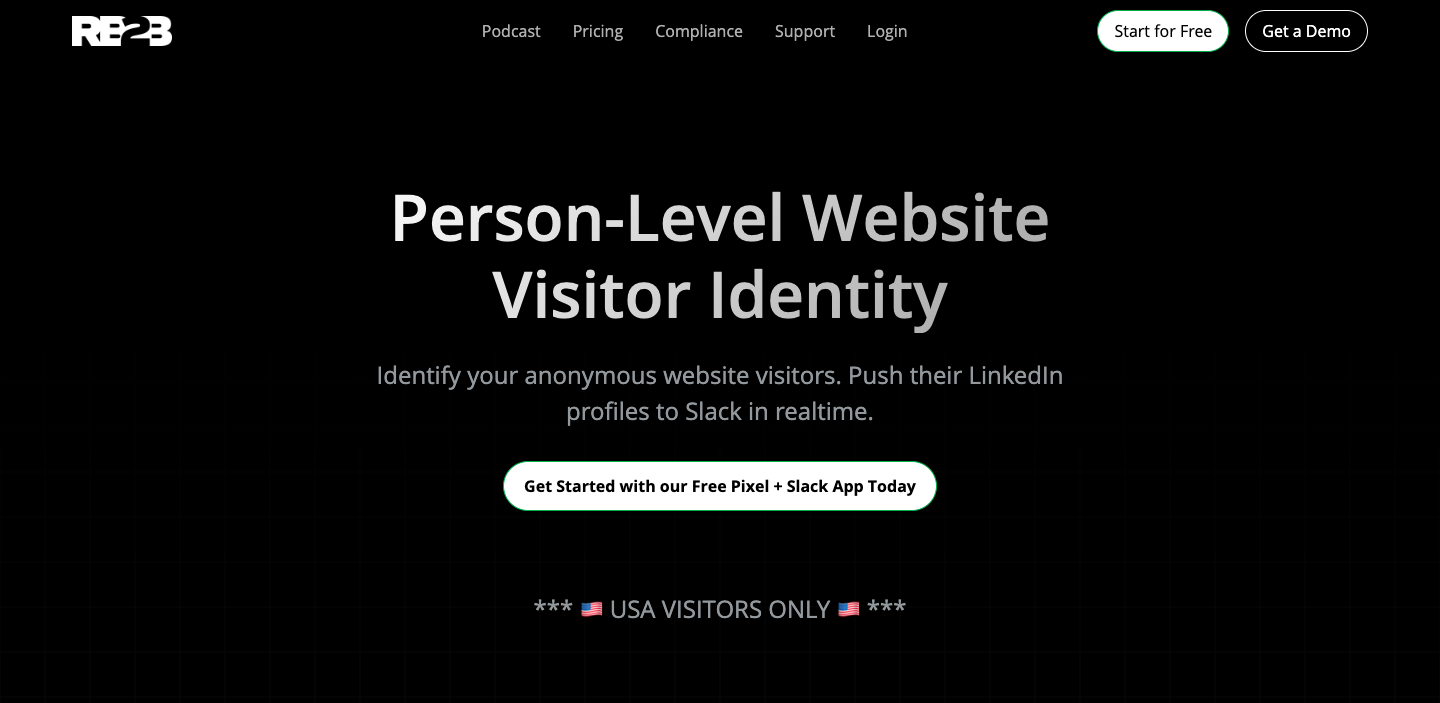
RB2B is a person-level website identification software for only US visitors. Unlike other visitor identification software that only identifies companies, visitor identification software goes a little extra to identify the anonymous visitor (person or company) that visited your site.
Thanks to this information, you can figure out the high-intent prospects who visit your site and craft the perfect message to scale your sales efforts. RB2B integrates with various software such as Slack, HubSpot, Salesforce, Salesloft, Marketo, and more.
How RB2B Works
To start with RB2B, you must first install the software’s script into the website’s header. The software combines 1st and 3rd party cookies, device IDs, and the user’s IP address to track and identify anonymous visitors.
Once the visitor's identity is revealed, RB2B pushes the person’s contact information to you via Slack in real time. The contact information includes the visitor’s name, their job title, their company, their LinkedIn profile URL, their work email address, the exact page they visit, the link they click, and their location. You will also see your visitor’s image (headshot) on the right side of your screen. Don’t miss a lead. Use our free email finder to find real emails and reach out faster.
Free Email Finder
Find verified email addresses instantly. Use it right here, completely free.
Here is an example of how RB2B presents ColdIQ’s visitor information on Slack. It displays their user data such as their LinkedIn profile, company names, the visited page, email address, and more.
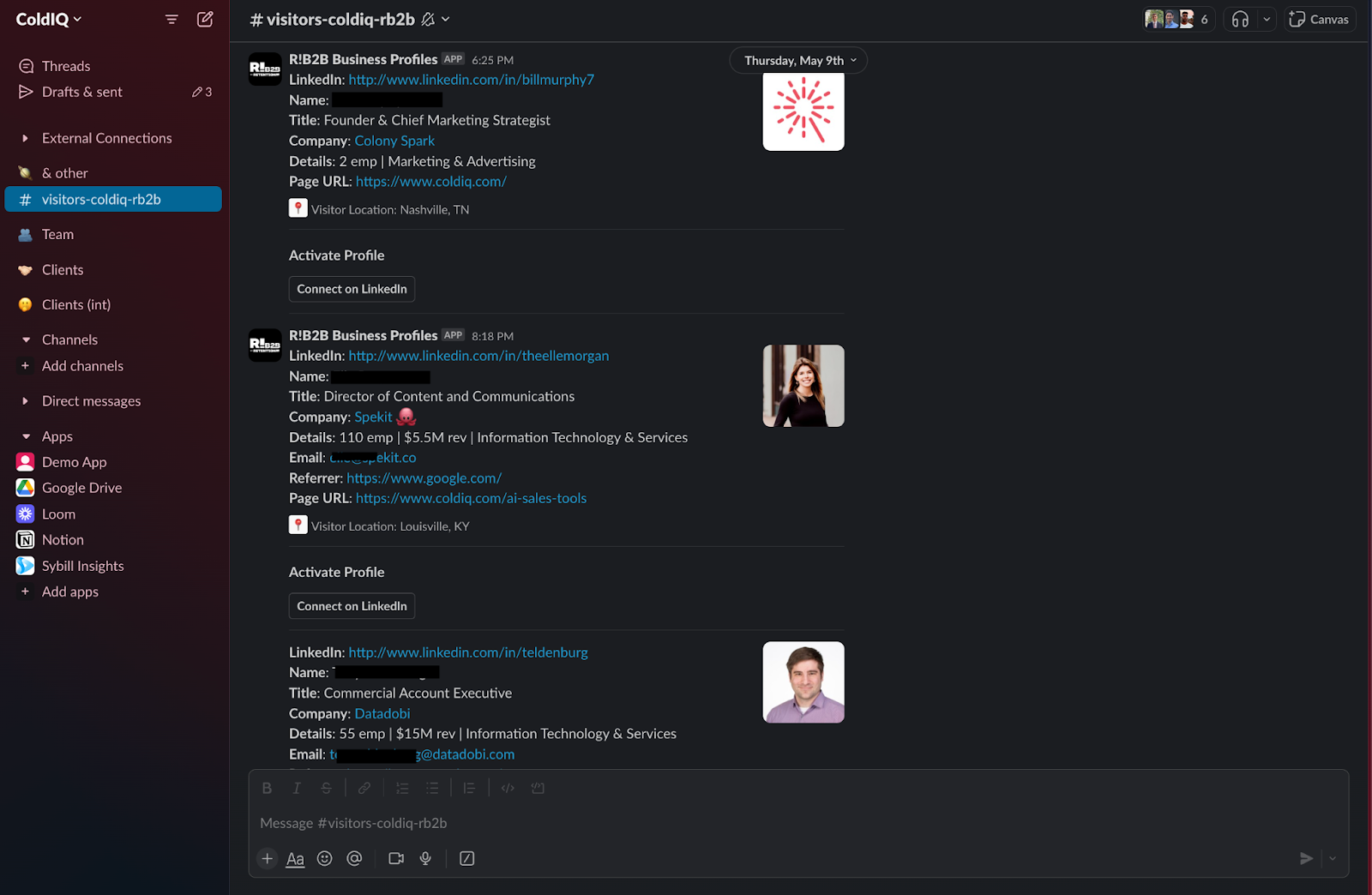
Compliance and Regulation Measures
RB2B only targets US-based visitors. This means the GDPR policy doesn’t apply to the software. However, the tool is 100% compliant with other regulations such as the CCPA and the CPRA.
Rating on G2
RB2B has a 4.9 out of 5 rating on G2.
Pricing
RB2B offers a free version for users. This free plan pushes the website’s visitor’s information to Slack. But if you want additional features, you must sign up for its pro plan.
This pro plan pushes information to CRMs and other tools like Apollo, Salesforce, and more. It also offers additional features that streamline your workflow. The plan costs $495.
Reaching Out to Your Leads
Now that you have identified your anonymous visitors, your next goal is to reach out to them. Here are some tools to automate the process and enable your sales team to reach your leads efficiently.
2. Clay — Best for Enrichment
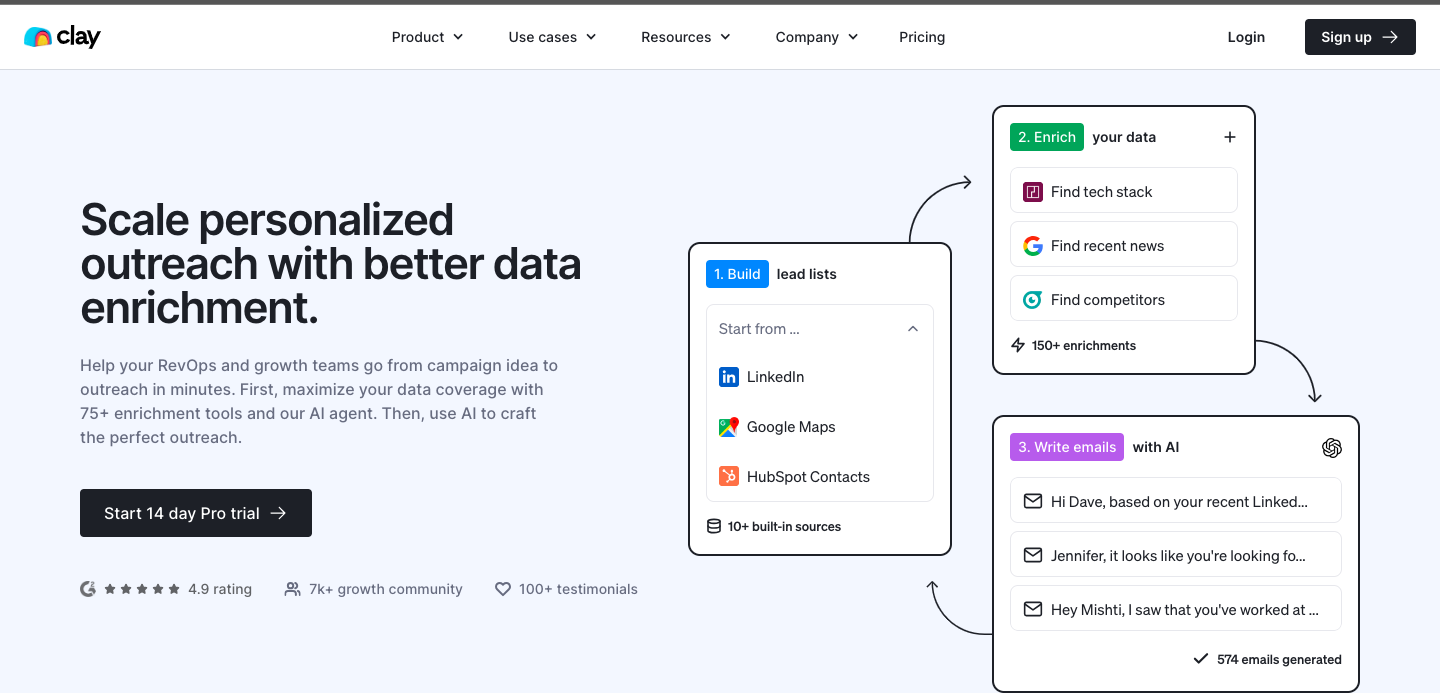
As a B2B business owner, you don’t want to send email messages to invalid email addresses. You want to ensure your messages reach people’s inbox rather than their spam folders. This is where Clay appears in the picture.
Clay is a waterfall enrichment solution that enriches your lead list and maximizes your sales pipeline. The tool scouts over 50 data sources to provide your lead’s valid email addresses, so your sales teams can reach them effectively.
How Clay Works
After you obtain your visitor’s information from RB2B, you want to ensure that you have their real email addresses. Since RB2B pushes these data to Clay, it will automatically generate the enriched list for you to use.
Your sales teams can use the information to determine those that qualify as your potential customers. If you want, you can also download the list in a CSV or XLS file for use.
Rating on G2
Clay’s rating is 4.9 out of 5.
Pricing
Clay offers five pricing packages for its users. These pricing packages include:
- A free plan that lasts 14 days and offers 100 credits
- Starter plan for $149 per month and offers 2,000 credits
- Explorer plan for $349 per month and offers 10,000 credits
- Pro plan for $800 per month and offers 50,000 credits
- Enterprise plan which requires a quote.
3. Smartlead — Best for Outreach
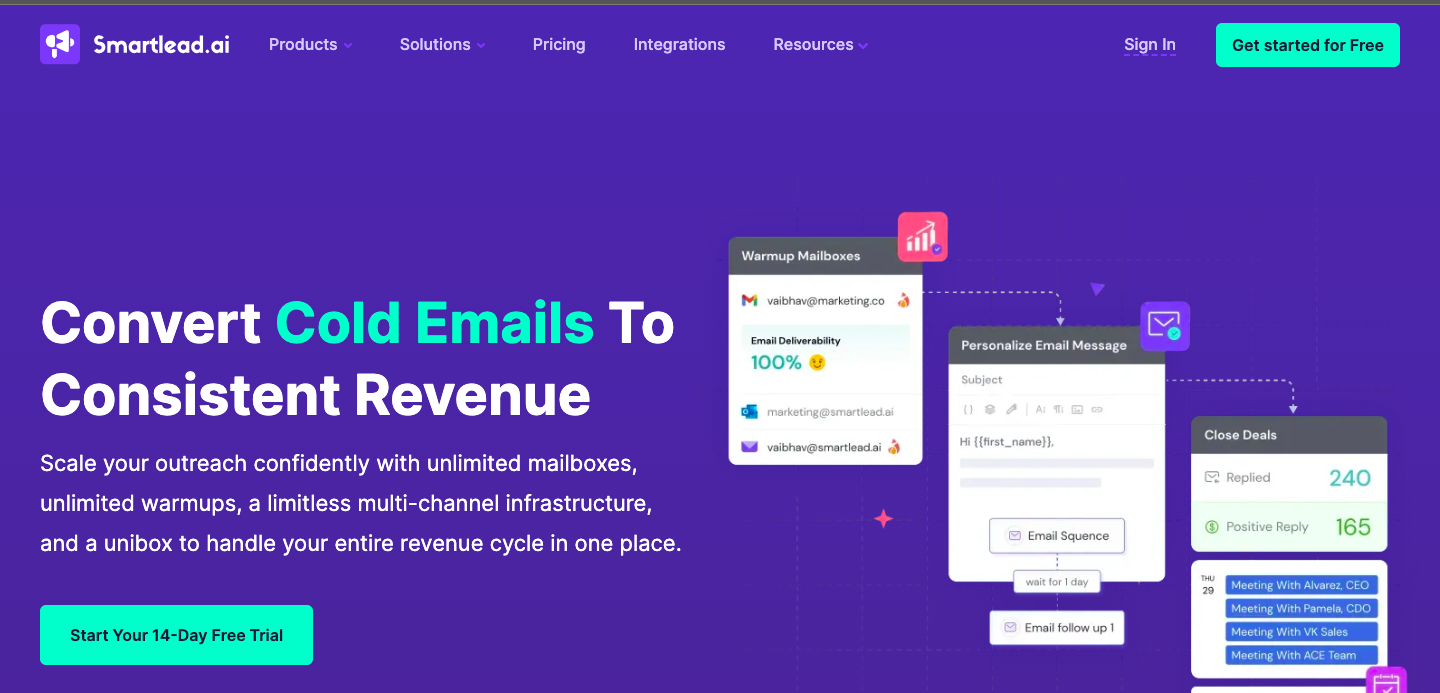
Smartlead scales your outreach processes with unlimited mailboxes to maximize your sales pipeline. The tool connects multiple mailboxes in one place and allows you to manage your campaigns in one click.
You can automate your campaign messages and send them to thousands of email addresses within few seconds. These email messages feature natural AI conversations that resonate and engage your leads. With these cold messages, your sales teams can generate leads for your outreach efforts.
Besides, you don’t have to worry about having your emails landing in spam. Smartlead protects your reputations by automatically moving your emails from the spam folder into their inbox, so they can open and act on your messages.
Additionally, its limitless multi-channel infrastructure enables your sales teams to launch marketing campaigns across various channels such as WhatsApp, Twitter, SMS, and more. You can also book meetings with leads, follow-up messages, or even interact with them. By doing this, you push them through the entire funnel.
Smartlead also tracks relevant data to determine what it’s working in your campaign process. It conducts A/B tests on your email sequence to figure out the ones that effectively close leads. It also tracks various email metrics such as open, click-through, and response rates.
Rating on G2
Smartlead’s rating on G2 is 4.8 out of 5
Pricing
Smartlead offers four pricing plans for its users. This pricing plan includes:
- Basic plan for $34 per month
- Popular plan for $66 per month
- Po plan for $79 per month
- Custom plan for $174 per month
Factors to Consider in Choosing A Website Visitor Identification Software
There are a wide variety of web visitor identification tools to choose from. But before you select one, here are some factors you should consider.
1. Does the company provide person-level information?
It’s not all web visitor identification tools that provide detailed contact information about specific prospects. Some of these tools would only provide your prospect’s company name. If you’re lucky, the tool can provide a list of decision-makers in that company.
Without this information, you can’t run your sales campaign. You need to know who you’re targeting rather than guessing who you should contact. The solution is to look for a company that provides you with the full details about your website visits. With this information, you can track user behavior and make informed decisions that contribute to your outbound efforts.
2. Does the Tool Provide B2B or B2C Data?
Before you select a tool for your campaign efforts, it’s essential you determine the type of data it can identify. If you need B2B leads, you should look for visitor tracking tools that identify this kind of data. Otherwise, you could have a lower match rate and end up not having sufficient information about your targeted leads.
3. Does it integrate with other platforms?
Many sales teams need a tool that can streamline their workflow. While some tools make it easy to push your records to platforms such as CRMs or enrichment tools, others may not.
It’s ideal to choose a web visitor tracking tool that connects directly with other platforms and sends your collated data there with ease. This saves you time and enables you to get the most out of your sales efforts.
4. Does the Tool Comply with Regulations in Your Target Market?
The web visitor identification tool you use must comply with the regulations within your target market. For instance, if you intend to target the European market, you must choose a website identification tool that complies with GDPR.
The GDPR protects information that relates to a specific person, whether name, identification number, location, social or cultural identity, and more. Violating these policies will result in hefty fines of up to 10 or 20 million euros, depending on its severity.
Benefits of Website Visitor Identification
Here are four benefits of using website visitor identification software.
1. You can reach your customers
Without visitor identification software, you can’t reach the people who visit your website. The best you can do is to retarget them on ad platforms or implement other campaigns.
However, website visitor identification software provides a holistic view of those who are interested in your services. You would have your visitor’s contact information, pitch to them, and generate quality leads for your business.
2. It provides insights into your prospects’ journey
Website visitor identification software can identify the pages that resonate the most with your prospects. For instance, it lets you see the movement of anonymous website visitors and identify pages that improve their experiences or the ones that cause friction.
Thanks to the information about your prospect’s movement on your site, you can understand their pain point and plan your sales pitch accordingly. Besides, if a page causes friction for your prospects and results in abandonment, you can figure out the problem and implement a solution accordingly.
3. Personalized Sales Pitch
As mentioned earlier, web visitor identification software provides insights about your prospect’s journey on your site. You can know the exact page they visit, especially their pain points. This valuable information can help you tailor your sales pitch to fit your prospect’s needs.
Let’s say a visitor consumes many blogs about a particular service on your site. This could provide a hint for your sales rep to craft copies that focus on that service. This personalized selling approach enables you to tailor your sales efforts to solve your prospects’ needs.
4. Drive Sales Conversions
The non-existence of visitor identification software implies that your sales team would wait for your prospects to submit their contact information. That could waste time, make you miss out on a prospect, and affect your conversion rates.
With visitor identification software, you can’t miss out on these deals. You would know the page a prospect visits, perhaps the “pricing” or “schedule a demo” page. This information capitalizes on your lead generation efforts, enabling you to increase your conversion rates.
Conclusion
Website traffic is a rich source of visitor information for many B2B companies. Identifying this traffic at a personal level would accelerate your sales efforts and drive hot leads for your business. However, if you’re not familiar with this approach, ColdIQ is available for your needs.
Our sales prospecting and consulting services handle all your sales processes to facilitate your company’s growth. Whether it’s identifying your web visitors, enriching the list with valid email addresses, or reaching out to them through engaging sales copies, we can achieve your goals.
All you need to do is to let us take charge and find your ideal prospects who can convert to paying customers. Book a strategy call today to get the most out of your investment.
FAQs about Web Visitors Identification
Can I see who Visited my Website?
Yes, visitor identification software provides relevant information about a particular visitor. Whether it’s a landing page they visited, their email addresses, or their location, the website visitor identification tool provides and records this information. These insights enable you to craft personalized sales pitches that resonate with your audience.
What information can I obtain with Web Identification Tools?
The information you can collect varies by software. But RB2B provides the visitor’s full name, their job title, company, email address, LinkedIn address, and the page they visit.
Is Website Visitor Identification the same as Website Analytics?
No. Website analytics involves using analytics tools to measure your site’s performance, in terms of traffic and conversions. You can obtain information about the number of people who visited and engaged with your site, the pages that drive the most traffic, the traffic source, and more.
However, website visitor identification software provides contact information about a specific visitor. They provide their full names, email addresses, locations, phone numbers, and more.
What are the Privacy and Regulation Risks Associated with Using Visitor Identification Tools?
The privacy and regulation risks of using these tools vary by software and the location that you target. While some tools target only US traffic, others don't. Overall, all compliance and regulation measures depend on the company that provides the identification tool.
FAQ
Verify the tool's compliance with international laws like GDPR or CCPA. Check if it anonymizes sensitive data and offers clear opt-out options. This helps protect visitor information and avoids legal issues.
Most tools can track mobile visitors through cookies and device IDs, but accuracy may vary. Ensure the software supports cross-device tracking for consistent visitor identification. Mobile traffic is a significant part of website visits today.
Can visitor identification software integrate with marketing automation platforms?
What challenges arise when identifying visitors from privacy-focused browsers?
Let's Get Started!
Schedule a 30-minute call with ColdIQ leadership to learn how our outbound strategy and sales tools help generate qualified leads and close deals.
.avif)
.svg)



